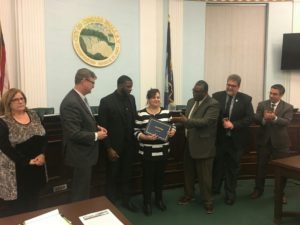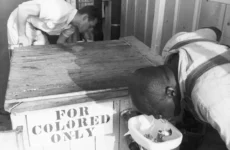The most highly taxed city in the most highly taxed state in the entire country is about to get pricier, thanks to Niagara Falls, New York, Mayor Paul Dyster and the rubber stamp City Council majority that slavishly serves him.
Over the nine years of his reign of error, the mayor has squandered between $16 million and $21 million a year on fixing potholes, paying off his political cronies, staging bad rock concerts and other frivolous and wasteful pursuits. Now the city is broke and he thinks you ought to pay for it.
Last Friday, Mr. Dyster proposed a property tax increase of 2.8 percent for residents and a whopping 14 percent increase for businesses as a part of his 2018 budget plan, which he presented to the council during a time of impending bankruptcy for the city.
He also urged the state of New York and the Seneca Nation of Indians to resolve their dispute over a casino revenue-sharing agreement, which has left Niagara Falls without the millions of dollars the mayor has been accustomed to receiving as a part of the deal.
It’s not going to happen. The Seneca are adamant and he and Gov. Andrew Cuomo signed off on a 20-year extension of the original 2002 compact that calls for no additional payments from the tribe. With that dispute entering a lengthy arbitration process, the desperate mayor was left with no choice but to continue to deplete residual casino funding in his 2018 budget.
Shockingly, he did not call for any layoffs, or cutbacks in city spending in any way.
Mr. Dyster told the council his administration’s budget seeks “to minimize the potentially disastrous effects” of the casino revenue cutoff by the Seneca, even though he has faith in Gov. Cuomo’s assertion that the gaming compact requires revenue-sharing to continue.
“We’re going to continue to assert our right to receive these revenues,” Mr. Dyster said in an interview after the presentation, “but we’re not going to budget them.”
Councilman Kenny Tompkins took an altogether different view.
“I think they are absolutely f***ing nuts,” he said in an interview in an interview with Niagara News Source. “They are throwing every last hard decision on the council,” Mr. Tompkins said.
“I think he’s right to cut by attrition,” the councilman added. “I think there’s a lot of fat in the budget. I think there’s a lot of stuff that needs to come out.”
With the November election looming and the heads of Mayor Dyster’s City Council supporters Kristen Grandinetti and Andrew Touma on the chopping block, Mr. Tompkins said the people of Niagara Falls are angry.
“I walked into the Marketside for breakfast and I got mugged. Little old ladies and older guys saying, ‘What are you gonna do with our taxes?!?! What are you gonna do with our taxes?'” he said. “People are upset. People are scared. There’ve got to be ways to do something about it. There’s got to be a way.”
Budget hearings will take place 5 p.m. each Wednesday during October in Council Chambers at City Hall. Ms. Grandinetti, Mr. Touma and lame duck City Councilman Charlie Walker, who wisely chose not to run for another term, will delay the actual budget vote until after the election, but make no mistake about where their loyalties lie.
The shocking tax hike comes in the wake of a September audit from State Comptroller Thomas DiNapoli that criticized the city for relying too heavily on the casino revenue.
It says each year the city has used more of the revenue to fill the budget gap and by the end of 2017 the fund balance will be depleted.
The audit called on the city to come up with a multiyear plan to move forward.
“The task is large but certainly we can do this,” said City Councilman Andrew Touma. “We’ve had this conversation for quite some time.”
Mr. Touma said last year the city cut casino revenue in the budget by 15 percent and planned to cut it by 10 percent each following year.
“We realized, you know, we need to start pulling that back and use it for economic development to grow the city, rather than use if for day to day operations,” he said. “Now because of the casino issue, we’re taking a much more aggressive approach.”
Mr. Touma said the city needs to cut expenses, consolidate departments and share more services.
“I don’t want to see a property tax increase,” he said. “I don’t think there’s going to be one this year but that doesn’t mean there’s not going to be one down the road.”
The audit reveals that property tax revenue hasn’t grown since 2015. The council did not approve a tax hike in the last budget. Still, Mayor Dyster refuses to take off his rose colored glasses.
“Sales tax revenue, bed tax revenue, parking revenues are growing, but in spite of all of the new construction in Niagara Falls a lot of the property tax increase hasn’t hit our bottom line,” he said. “There’s a bright future ahead but obviously we’re going to have to get through some difficult times in the next year or two to get there,” he said.
Republican State Senator Rob Ortt issued this statement, “The Comptroller’s report comes as no surprise, and follows warnings recently expressed by the New York State Financial Control Board. We know the cause – years of irresponsible use of casino revenue. Now we know the solution. This report clearly outlines the steps Niagara Falls city officials need to take to avoid a considerable budget gap. The decisions that lie ahead will be difficult ones, but they will be vital to keeping the city afloat and away from fiscal insolvency. This is what true leadership requires, and this is what Falls residents deserve.”
An 11 percent tax increase would devastate business in the Cataract City. And a 2.8 percent increase on already overtaxed homeowners will simply result in more people fleeing, leaving behind the “zombie houses” that currently plague every single neighborhood in the city.
Mayor Dyster’s budget is simply payback to the city’s unions, which overwhelmingly voted for him last year.
And as usual, the hardworking private sector businesspeople and homeowners are the ones left holding the bag.




















